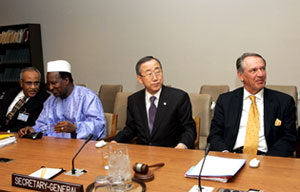- U.S. and Britain want tougher sanctions for Sudan (FCN, 04-24-2007)
- Sudanese president answers questions on Darfur (FCN, 05-14-2007)
- Reconnecting the international struggles of Black people (Min. Louis Farrakhan/FCN, 05-07-2006)
- FCN Editorial – Clear the cloud of confusion over Sudanese conflict (02-10-2005)

UNITED NATIONS (FinalCall.com) – African Union chairman Alpha Oumar Konare and United Nations Secretary-General Ban Ki-Moon recently met in New York for high-level discussions about problems in Sudan, particularly in the Darfur region.
“We have had very intensive discussions on how to address the Darfur situation; and we are encouraged by the positive signs we have received from the Sudanese government,” the secretary-general told reporters on Apr. 17.
The day before, Sudanese President Omar al-Bashir agreed to accept deployment of the United Nation’s “heavy support package,” which will supplement the 7,000-man African Union peacekeeping force in Darfur. Included in the heavy support package are 2,250 UN troops, 750 international police, and logistical and aviation equipment including six helicopter gun ships.
The Sudanese government has been accused of genocide in the Darfur region of the country as part of a civil war. Western nations, in particular, have been pushing the UN to take action. The deployment of an African peacekeeping force to protect civilians in Darfur has been seen as a compromise. The Sudanese government has denied that genocide has been committed.
The AU called for the “consideration of sustainable funding for the African Union Mission in Sudan” following the two-day talks. Ambassador Said Djinnit, AU commissioner for peace and security, told reporters AMIS is costing the AU $25 million a month.
“I share all the views that the secretary-general expressed and we will continue to strengthen this partnership between the African Union and the United Nations,” Mr. Konare said. The meeting between the AU leader and UN secretary-general was held Apr. 16-17.
The New York Times published a story Apr. 16 claiming that a “confidential report” leaked to the paper accused the Sudanese government of “painting” its own military planes to disguise them as United Nations or African Union aircraft.
“The freshly painted planes are being operated out of all three of Darfur’s principal airports and are being used for aerial surveillance and bombardments of villages,” the Times said. The article also charged the Bashir administration with flying “ammunition and weapons into the western region” in violation of a 2005 arms embargo.
The confidential report to the Panel of Experts, which is still being studied by the UN Sanctions Committee, was the reputed source for the Times story. The newspaper said the report was leaked by a member of the 15-member Security Council. The Associated Press said the report was given to their UN correspondent, and was originally leaked to the London-based Guardian on Mar. 28.
“The Sudan was shocked and outraged to see the report fully leaked to The New York Times,” Sudanese Ambassador Abdelmahmood Abdelhaleem said, in a prepared statement. As he walked through the corridors of the United Nations, Amb. Abdelhaleem called those responsible for the leak “enemies of peace and stability” in his nation.
The ambassador denounced the charges as false, saying they had previously been discussed. “The publication of the report in the aforesaid newspaper and its timing, raises serious questions about the real intentions behind such leaks,” he said.
“Leaking of the report not only jeopardizes and compromises required professionalism, but also seriously hurt the image of the United Nations and its Security Council,” added the Sudanese statement, released Apr. 18.
President George W. Bush warned Apr. 18 that the U.S. was poised to “take unilateral steps against Sudan, including sanctions against 29 government-controlled Sudanese companies and the blocking of any dollar-based transactions conducted by Khartoum.” The president said Sudan had “one last chance” to accept a 20,000 strong UN peacekeeping force approved by the Security Council.
A Wall Street Journal op-ed called for “destroying of Khartoum’s air force on the ground” the “next time evidence emerges that Pres. Bashir is using it against Darfur.”
U.S. State Department spokesman Sean McCormack said, “It’s a positive thing that this report is coming out because it is important information that will inform the debate about what diplomatic steps should be taken concerning Darfur.”
“This information is baseless,” countered Sudanese Army spokesman Brigadier General Othman Mohammed al-Aghbach in an AFP article. “This type of accusation is unacceptable and can put an end to cooperation with the parties initiating them,” he said.
Secretary-General Ban called on Sudan to “clarify the accusations” in a press statement.
Calls to the AU office in New York for comment were not returned at Final Call press time.












